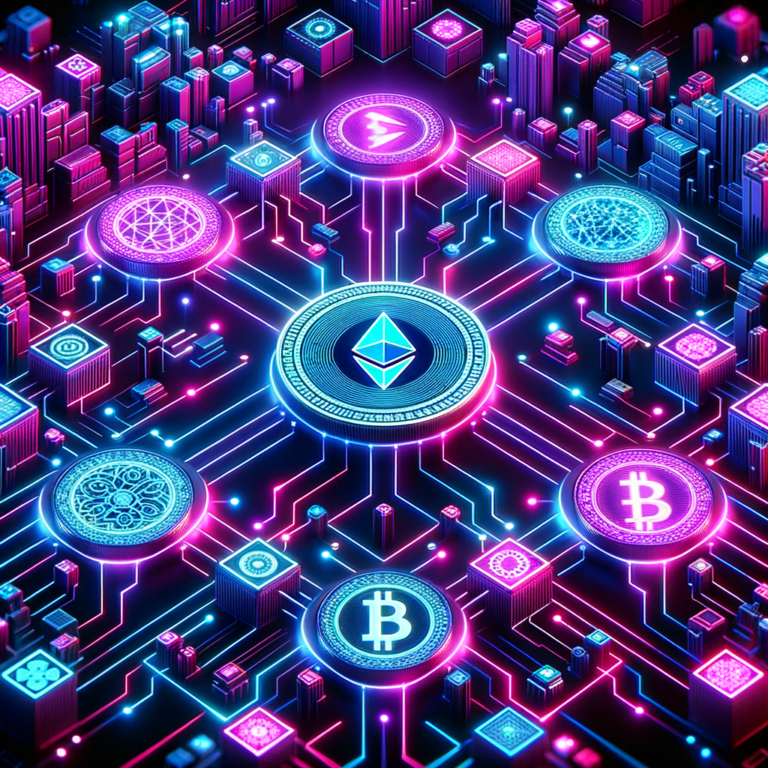Ethereum vs. Others: Ultimate NFT Blockchain Showdown
Ethereum: The Trailblazer of NFTs
Ethereum remains a foundational technology in the NFT space, underpinned by its robust security and a vast selection of decentralized applications. Although it boasts the highest market share, it is stymied by notably high transaction costs and limited scalability—capable of processing only about 15-45 transactions per second. Despite this, Ethereum’s transition to Ethereum 2.0, which will implement sharding and proof-of-stake, promises significant improvements in both cost and scalability.
Solana: High Speed and Low Cost
Solana attracts users through its extraordinary processing capability of over 65,000 transactions per second, leveraging its Proof of History consensus combined with Proof of Stake. Apart from its scalability, Solana offers some of the lowest transaction fees, averaging just $0.00025 per transaction. However, these benefits come with a trade-off in decentralization, possibly affecting security when compared to Ethereum’s widely distributed network.
Polygon: Bridging the Gap
Polygon operates as a Layer 2 solution augmenting Ethereum’s capabilities, especially in terms of transaction speed and cost. By processing around 65,000 transactions per second, it remarkably reduces the cost while still maintaining a high degree of security, leveraging the underlying security features of Ethereum’s main chain. Polygon also offers seamless development experiences due to its compatibility with Ethereum’s development environments.
Exploring Other Blockchain Platforms
There are several emerging platforms providing unique advantages, particularly in faster transactions and lower fees. Binance Smart Chain, for example, is recognized for its low-fee environment and compatibility with Ethereum’s tools and tokens. It has become a popular choice for NFT marketplaces and decentralized apps that require a high throughput.
Flow blockchain, crafted specifically for gaming and collectibles, is designed to be user-friendly and scalable without compromising the network’s throughput. It’s already home to significant NFT ventures such as NBA Top Shot and is becoming a go-to for developers focused on natively digital assets.
On the other hand, Tezos appeals to those particularly concerned about sustainability, offering a more energy-efficient alternative with its Proof of Stake protocol. It hosts increasingly popular NFT marketplaces, such as Hic et Nunc, and is known for its lower gas fees and self-amendment capability.
Wax and Traction in the NFT Market
Wax, an NFT-specific blockchain, supports high transaction rates and rich interaction with digital goods and gaming. It is poised as a strong option for projects centered on collectibles and interactive applications, underpinning simple but effective transactional capabilities.
Considerations for NFT Project Development
The ideal blockchain for an NFT project largely hinges on what the creators value most: Is it the cost of transactions, the speed, security, or the network’s robustness and scalability? Ethereum, with its extensive infrastructure and planned upgrades, remains a strong foundation albeit often costly in transaction fees. Solana, Polygon, and others like Tezos and Flow offer viable alternatives particularly when prioritizing speed and efficiency.
Developers should consider not just technological capability but community support, market penetration, and long-term sustainability of the blockchain to ensure their project can evolve as the landscape changes. Ethereum’s sizeable community and historical dominance in the NFT market provide a reassuring environment for new projects, whereas platforms like Solana and Polygon may be preferable for projects needing higher transaction throughput and lower operational costs.
Each blockchain presents a unique set of features that cater to varied NFT use-cases. The rigorous evaluation of each platform’s merits and limitations against a project’s specific requirements is crucial for deriving the maximum potential impact and success of an NFT initiative.

